Will you live in a nursing home when getting old?
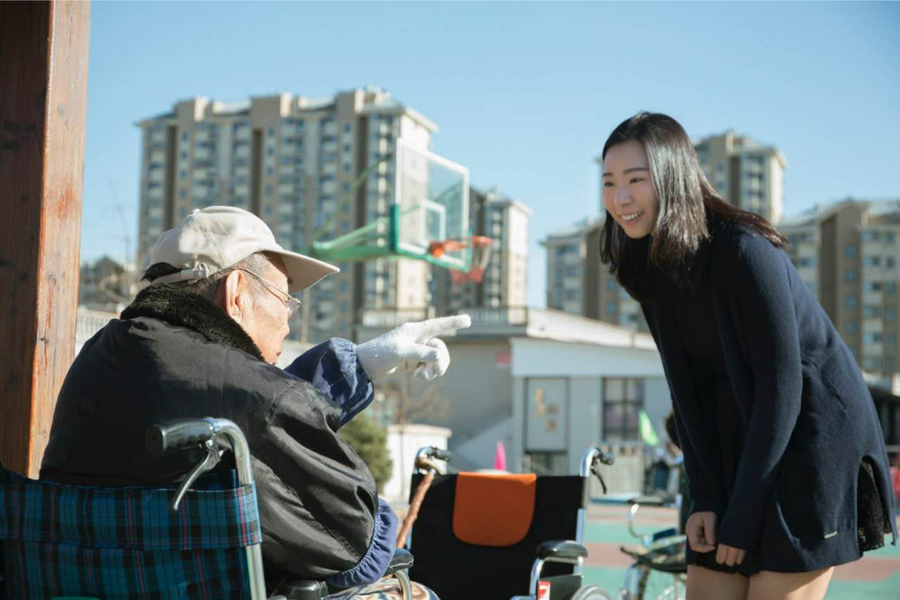
Teenage girl Gao Bihan chats with a senior citizen while doing volunteer service at the Beijing Chaoyang Oriental Comprehensive Nursing Home. [Photo: chinaplus.cri.cn]
Have you, in your 20s or 30s, imagined living in a nursing home away from your family and relatives?
You may have never extended your imaginations to such an extent as you are young, energetic and busy with the colorful lives.
But such a prospect may be unavoidable and it’s been a reality for many senior residents in developed nations and China as well.
Along with its eye-catching economic growth in recent decades, the world’s most populous nation has also been aging rapidly.
Having long passed the international threshold of an “aging society,” China is facing great challenges to provide elderly care for the hundreds of millions of people already above the age of 60.
As the government finds itself short of the funds needed to build all the nursing homes required, it has been encouraging private investment and volunteer services to fill the gap.
But is the scheme feasible? And what’s life really like in China’s residential care homes?
To answer these questions, I visited a nursing home in Beijing to find out more.
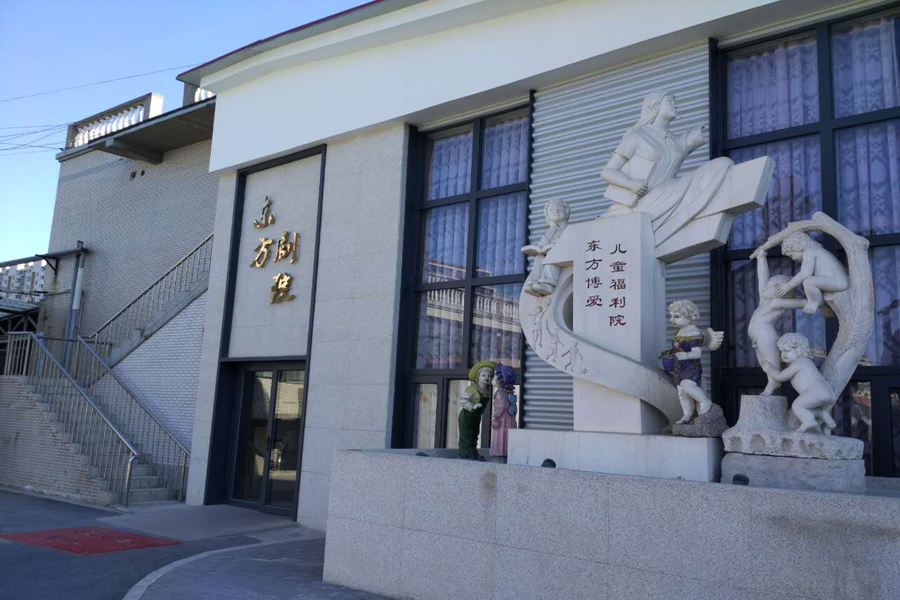
A photo exhibition organized by Gao Bihan is held in this small theatre on the nursing home campus, depicting the happy life of retirees living there. [Photo: chinaplus.cri.cn]
In the far, rural northeast of the Chinese capital, a building complex stands out on a dry, sunny day in early spring.
After an hour and a half drive from the city center, I was feeling a little dizzy as I approached the complex and stepped out of my cab. It's early afternoon on March the thirteenth.
Quickly refreshing myself with a deep breath of the cleaner air in these rural, woody surroundings, I was ushered into the complex—the Beijing Chaoyang Oriental Comprehensive Nursing Home.
As I stood on the nursing home campus, I might have imagined I was in a luxury garden hotel if I’m not told this is a residential care home for senior citizens.
While wondering what the life of the retirees here is like, I came to a small theatre in the middle of the campus, where a photo exhibition is being held.
The exhibition, organized by a high school girl named Gao Bihan, highlights the exact daily lives of the seniors living here, which I came to find out.
The photos in the exhibition show the smiling faces and other happy moments of the residents' lives. Most of the subjects are in their 80s or 90s.
Sixty-five-year-old Qiao Xiuzhen, founding president of the nursing home, explains the story behind the photo exhibition.
“Gao Bihan and her parents and grandma have been volunteering for the old people here for over two years. She put up this photo exhibition to show what it's like to live here for the pensioners.
“The girl has done a very good job! She has made a lot of people here very happy, and I thank her a great deal. ”
Seventeen-year-old Gao Bihan studies at a high school in the United States. The girl comes to the nursing home to chat with the old people and take pictures of them every holiday when she returns to China from her studies.
Speaking in fluent English, Gao says the volunteer service has made her happy because she feels needed here.
“They really make me feel that I’m needed. Like I take pictures and then print the pictures and give back to them. A lot of times, they just like, ‘Oh my god, I didn’t know you gonna print it out and actually give it back to me.’
“Every time when they see their own pictures, they compliment my photography skills. And they are really happy that they can have their pictures as one of their memories they can hold onto. Every time I see them become happy because of me, I feel happy too!”
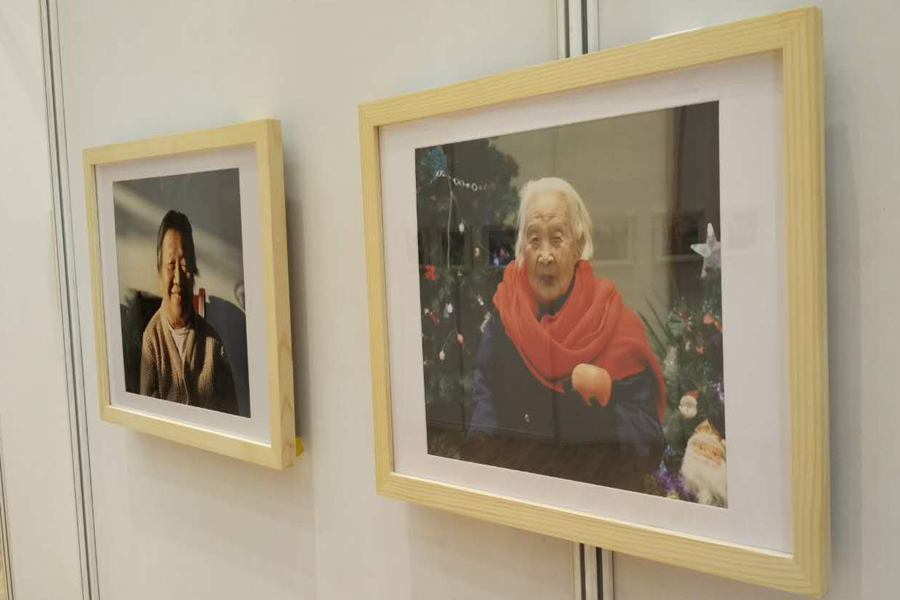
Some of the smiling faces of the senior citizens living in the nursing home captured by Gao Bihan’s camera. [Photo: chinaplus.cri.cn]
While Gao Bihan has recorded the lives of the nursing home’s inhabitants, its managers and care-givers have made sure they do their utmost to provide all the necessary living conditions and considerate care for them.
Founded in 1997, the nursing home now has a building area of 60,000 square meters, one of the largest privately-owned of its kind in Beijing.
Its founding president, Qiao Xiuzhen, a doctor herself, says her nursing home gives special, quality elderly care compared with other similar facilities.
“Hospitals basically don’t allow bed-ridden patients to stay long. Patients with chronic diseases, such as diabetes, can't live in hospitals. So I founded this nursing home to accommodate the needs of these people.
“A major difference between us and other nursing homes in Beijing is that we have a hospital on our site. Some 60 well-established doctors are working in this hospital and can meet most of the medical needs of the people living here.”
Besides professional elderly care, the nursing home also arranges for primary school students and other groups to do volunteer services for the retirees living here, such as tidying up their rooms.
According to Han Shuhua, who is in charge of the nursing home’s managerial affairs, the majority of the 700 old people living here can’t take care of themselves.
Considering the 3,000 beds available here, the occupancy rate of the nursing home is just over 20 percent.
The low occupancy rate can be partly explained by the long-standing Chinese tradition that the elderly should be looked after by their children at home.
But it's not just that -- the expense is very likely to be another main reason.
On average, it costs a pensioner 3,500 to 4,000 yuan – which is between 500 and 600 US dollars a month – to live here.
The amount is high but still affordable for a middle-class retiree from Beijing or other affluent Chinese cities with their handsome pensions.
Yet for a less well-off retiree, the home is well out of reach if their children can’t pay for the shortfall.
For those who can afford to choose and live in this nursing home, life is good enough.
Eighty-four-year-old Wu Qingqi moved here in 2009 after a medical operation. When I saw her, she was moving slowly along with the support of a stick and enjoying the photo exhibition.
Smiling heartily and speaking with a clear, sound voice, she told me that before retirement, she worked as a university professor in the far west Xinjiang region.
She says she is happy with life in the nursing home in Beijing.
“When I first came here, I was bed ridden, so the care-giver lived with me in the same room for a time.
“Now as I can move on my own two feet, care-givers come to my room every few minutes. They are very kind and caring. I have recovered to such an extent that I now don't need anyone's help to walk.”
While Wu Qingqi was telling me her story, another elegant and neatly-dressed old lady smiled to us in agreement.
Speaking with a soft and enchanting southern China accent, 81-year-old Zheng Xiangying says she has spent two years in the nursing home.
Having worked in the man-made crystal industry in Beijing before retirement, she told me she quite enjoys life in the nursing home, although she would still be capable of taking care of herself if she lived at home.
“I don’t want to cook at home. By living in a nursing home, I don’t need to worry about this. So I came here. Before moving to this nursing home, I compared many nursing homes and finally chose this one.
“This nursing home has an affiliated hospital, which is what I really need. The service provided here is very good!”
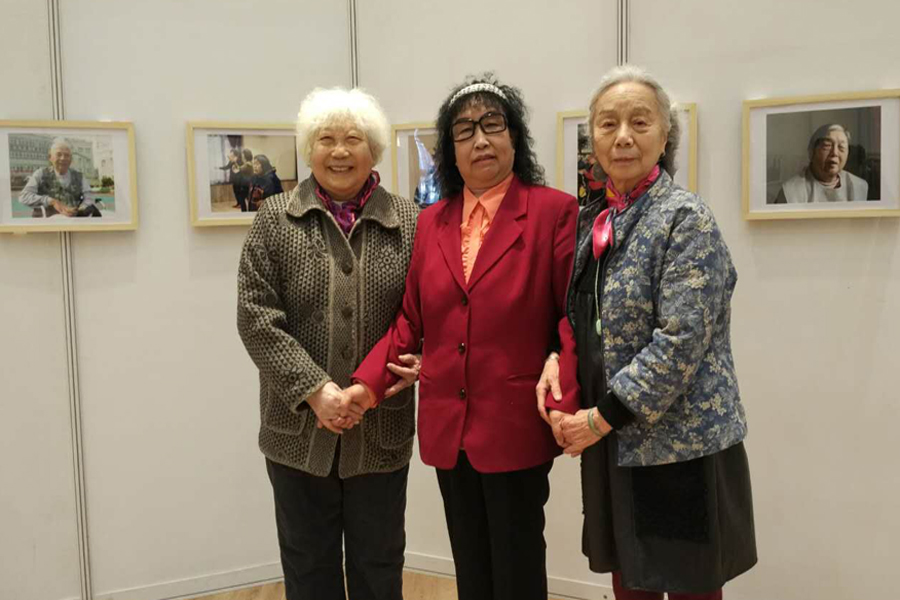
Founder of the Beijing nursing home Qiao Xiuzhen(center) with Wu Qingqi(left) and Zheng Xiangying at the photo exhibition. [Photo: chinaplus.cri.cn]
Actually, this Beijing nursing home epitomizes China’s massive aging problem as well as the huge business potential in the expanding elderly care market.
The latest available official figures show that China was home to 222 million people aged 60 or above at the end of 2015.
This number made up 16.1 percent of the total population, according to the Ministry of Civil Affairs.
And more than one out of ten Chinese people are 65 years old or older.
By international standards, a country or region is considered to be an "aging society" when the number of people aged 60 or above reaches 10 percent or more. China has qualified since 1999.
The government estimates that the country will have 255 million people at this age by 2020, and the proportion of the total population will reach 17.8 percent.
At the moment, China has some 116,000 nursing homes, accommodating about six million 727-thousand beds. This means that for every thousand senior citizens there are just 30 beds.
The supply is clearly far from enough to meet demand.
According to a plan recently released by the State Council, China’s cabinet, government-run nursing home beds should make up less than half of the total number of such beds in a locality.
This means that private investment will have to step in to meet the shortfall.
In this regard, authorities have promised to fully open up the elderly care market and put more private capital into the sector.
On March 8th, civil affairs minister Huang Shuxian said China was about to launch a campaign to improve services for the elderly.
The official admitted that the nation “doesn't have enough qualified elderly care nursing facilities right now."
He said the government would “encourage all areas of society to participate in the campaign."
The central authorities have also proposed to reform state-run elderly care institutions and improve elderly care services in communities and rural areas to make sure more elderly people can enjoy quality senior care services.
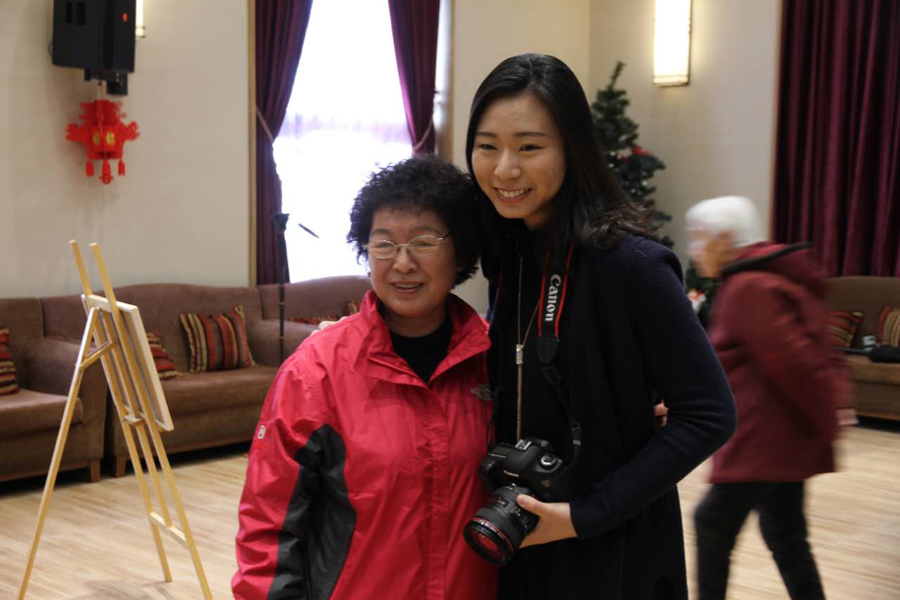
Teenage volunteer Gao Bihan says she will find other ways to bring happiness to the seniors besides recording their happy moments with her camera. [Photo: chinaplus.cri.cn]
Indeed, the country, with its vast land and population, is in great need of various kinds of public and welfare services and, of course, contributions from ordinary citizen volunteers.
Gao Bihan, the teenage girl who has enjoyed her volunteer work in Qiao Xiuzhen’s nursing home, says she will continue with her elderly care services.
“I spent most of my time with my grandma and grandpa when I was young. I have that really deep connection with the elderly people. And also I did similar community service in my high school in America.
“I’ll definitely continue to do what I’m doing right now, maybe find more, better ways to bring them happiness other than taking pictures. And I’m trying to get other people to do similar things as well.”
[The audio clip is from our weekly features program Life Upclose, produced by CRI. You can get the complete audio by searching “Life Upclose” in the Apple Podcast.]

